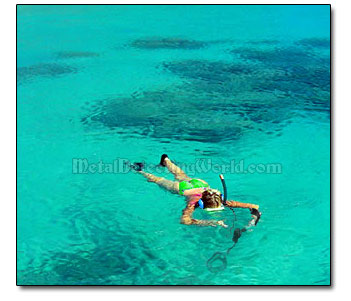Types of Metal Detecting Activities, page 24
UNDERWATER TREASURE HUNTING:
Snorkeling With A Metal Detector - Tips, Metal Detectors and Accessories Required
(...CONTINUED from previous page)
Metal Detectors Required

For shallow underwater metal detecting with a snorkel, you only need a metal detector that is waterproof.
Basically such a metal detector is designed to perform well in both salt- and freshwater, though, the search coils used for freshwater detecting may be of a different design.
Multi-Frequency motion metal detectors with Multiple Tone ID have an advantage over less advanced motion Discriminate VLF metal detectors because the latter easily get affected by black sand.
This magnetic sand causes a VLF search coil to overload; thus, making the metal detector's operational depth poor at best.
Pulse Induction (PI) metal detectors have an advantage over the Multi-Frequency detectors when it comes to operational depth range, but using them would require a lot of digging because of their lack of discrimination.
This always becomes critical in areas lying in close proximity to the beach where the concentrations of iron junk are high compared to deep surf.
Another advantage of the pulse detectors is that they do not require the search coil to be in motion in order to locate a target (they will sound a steady tone when held over a target); thus, saving a detectorist a lot of coil swinging efforts.
Any PI detector will work in black sand and ignore mineralization while maintaining high sensitivity to all metal targets; however, some false signals may result if the search coil is held very close to the bottom. These false responses can be smoothed out by using a longer pulse delay.
Most PI detectors are manually tuned. On land, every time the search conditions change, such as when moving from black sand to neutral sand or from dry land to salt water, the operator has to make re-adjustments, and the search coil must be swept slowly. This is not a problem when a PI metal detector is used for treasure hunting with a snorkel or scuba diving because the search coil cannot be swept quickly underwater.
To see what metal detectors for this metal detecting activity are available on the market today and read their reviews, you might want to visit my Metal Detectors for Beach/Surf/Underwater Treasure Hunting page.
Equipment, Snorkeling Gear and Accessories Required for Snorkeling with a Metal Detector
• Double Valve Snorkel requires less effort to clear.
• Snorkel Mask with a valve in the nose will allow you to clear it without stopping: just exhale through your nose and the water will be all gone. Or snorkeling goggles
• Good Fins can help you maneuver and stay in position.
• Snorkel Vest
• Long Stainless Trowel with wood handle.
• Multi-pocketed Belt is used to hold finds: one pocket is for coins, one pocket is for rings and additional pockets are for fishing weights and other miscellaneous items.
• Mesh Bag is used to hold all the trash that you may recover during the search. To conserve space, the aluminum beer and soda cans should be mashed. The mesh bag should be connected to the belt while snorkeling.
• Wet Suit is essential if you plan to detect in water for long periods or detect in cold waters. Water takes heat away from the body 25 times faster than air. Depending on the temperature and depth of the water you are snorkeling in, exposure suits will vary drastically in design, thickness and thermal protection. In the warm waters, you may choose to wear a lycra suit or a 1/8 inch short wet suit. Northeast treasure hunters prefer 1/4 inch wet suits with hood, boots, and gloves, or dry suits. Wet suit will also protect you from the sun. Sun Screen Lotion is a very good idea, especially the one that will last in the water for a long time.
This is an ad by Amazon. As an Amazon Associate I earn from qualifying purchases.